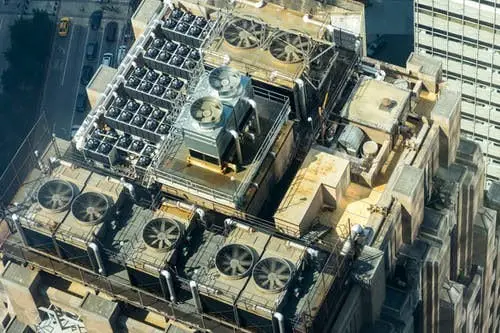

HVAC systems are used in buildings to provide a comfortable thermal environment to the occupants. They are one of the most significant sources of energy consumption in buildings. While thermal comfort level tends to be different among individuals, traditional HVAC systems are operated based on fixed setpoints and do not automatically consider the changing building conditions. With traditional HVAC systems, users have to adjust the thermal levels manually. Other than that, indoor activities also affect the proper optimization of these systems. More ventilation would be required in a kitchen space than in the workplace. Continually adjusting the settings is a difficult task. These situations can effectively be tackled by the use of Artificial Intelligence (AI). Artificial Intelligence can be integrated into the HVAC systems to improve their efficiency and minimize energy consumption. Here, we will discuss how AI can help boost the performance of HVAC systems.
The air temperature outside has a significant impact on the airflow inside the buildings. Ventilation systems usually operate at full airflow continuously, which is a huge waste of energy as excess heating or cooling is required depending upon the air temperature. AI-controlled smart ventilation systems are highly efficient in saving energy and optimize the airflow in the buildings TBH. They can also:
AI systems are excellent at managing the temperature levels in the buildings. Approximately 47% of the energy is saved by installing smart air conditioning systems. These systems analyze the temperature of the floor and the air and adjust the thermal levels according to the number of people present. Other than that, the right heating or cooling can be provided by these systems based on the users’ preferences. AI-controlled air conditioning systems provide high energy savings by automatically switching off in the absence of people.
An AI-based HVAC system can help reduce downtime. Modern smart HVAC systems predict when disruptions or failures may occur. They can also identify when maintenance will be required for the system of parts of the system. These systems also help pinpoint potential problems such as leakages or blockages in the ventilation systems and suggest the appropriate responses. According to research, AI-controlled equipment can provide up to 10% reduction in annual maintenance costs and approximately a 20% reduction in downtime.
It is evident that energy consumption levels can be reduced significantly by incorporating AI into buildings’ HVAC systems. With artificial intelligence, people are relieved of manually adjusting the buildings’ temperatures and ventilation levels again and again. AI-controlled HVACs do the job for you and reduce your energy bills. If you are interested in learning more about AI-based HVAC systems, you can talk to experts at Energy Control Systems, one of the leading energy solution providers in the country.
Additional Resources:
Computer Vision
Deep Learning
Robots
Bitcoin
Tezos
There’s nothing worse than lighting a new candle and watching it sputter out, tunnel, or…
Discover how woven metal fabric transforms restaurant design with its versatility, from feature walls to…
Upgrading your workspace? Get inspired by design ideas for materials, lighting, and amenities, and tips…
In recent years, the global interest in peptides has surged due to their wide-ranging benefits…
Maximize your workspace without overspending. Explore practical ways to expand your office using smart layouts,…
Discover how to create a thriving STEM community through hands-on, collaborative projects that are perfect…